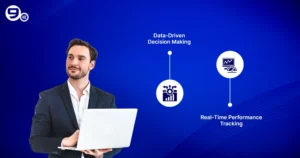In today’s competitive digital space, top enterprises and small startups are competing in the market for custom software solutions with faster deployment, round-the-clock support, and lower initial costs. Pre-built software is no longer ideal for changing business needs, so they are turning towards custom development that aligns with their unique requirements. Across the globe, the software market is witnessing a growth trajectory to reach a market volume of $902.74 billion by the year 2030. Custom software offers more benefits over traditional off-the-shelf software in terms of cost, flexibility, time, security, and support.
In this comprehensive blog, we will cover all the key benefits of custom software development to accomplish business strategic and operational goals.
Top 10 Benefits of Custom Software Development
As the demand for custom software is rising, companies get more benefits from custom software development in comparison to off-the-shelf software, adapting to features, UI/UX designs, and platform compatibility. Custom-built software fits with customer expectations and dynamic tech demand that ensures competitive feature differentiation and long-term adaptability.
Here are the following 10 strategic advantages that help businesses to scale with custom software development:
1: Tailored to Meet Unique Business Needs
Businesses coming from different sectors, manufacturing, retail, finance, and healthcare, have their distinct requirements for feature integration and customisation. Growing demand for AI-based specialised features and automated processes is pushing companies to opt for custom software development to stay competitive.
Aligning Software with Business Goals
Depending on the type of business, their vision alignment differs, and custom software should have matched the checklist. For example, a fintech company has the goal of enhancing security through fraud detection modules, while an eCommerce company focuses on global expansion by adding more products to its list. As the end goal is distinct, it can directly affect the development process, and customer software is an ideal fit.
Industry-Specific Customisation
Customisation can be of different types based on industry preferences that satisfy its distinct operational needs. For healthcare, these custom software might integrate for IoT-enabled health devices, an education platform has adaptive testing tools using AI to track patterns, and the retail sector is building custom POS (Point of Sale) for competitive advantage. These specialised software allow for valuable customisation to meet business needs.
2: Improved Efficiency and Productivity
Traditional software is bound by certain limits in operational efficiency; however, as digital business scales faster, more than 30% of sales are conducted online. As a result, a larger number of customers and faster product deliveries or prompt services are demanded. Businesses aim to eliminate monotonous tasks and choose custom software development, focusing on automation to reduce waste and scale faster.
Automation of Repetitive Tasks
Custom software replaces repetitive activities through an automated process of testing automation, quality assurance, optimised compiling code, and application deployment. It can significantly provide better quality products, reduce costs for custom development, and speed up deployments.
Streamlined Workflows for Teams
Every business follows a definite workflow, structured operations, and internal processes for productivity, so custom software is designed to simplify complex workflows. For instance, McDonald’s has launched its custom POS system to integrate with their backend kitchen management. It helps to streamline the flow of orders to reach the counter, resulting in faster services, efficient inventory management, and accurate order processing.
3: Enhanced Scalability and Flexibility
One key challenge with off-the-shelf software is that it limits the scope of customisation, so as the business evolves, it creates issues for scalability. Whether in terms of high volume of data, an increase in the number of users, and transactions, custom software built with a scalable architecture that can frequently update and adapt to changes.
Adapting to Future Business Growth
Custom software is designed in a flexible way for adapting to new systems, adding users, increasing workloads, and changing technologies. For building scalable custom software, it is essential to consider factors, including architecture design, database optimisation, analytics & monitoring, caching strategies, and load balancing, that develop adaptable software systems.
Take A look..
30 Top Software Development Companies in USA (2025)
Most businesses aim to scale their operations, expanding to multi-currency support and across new regions. Scalability and flexibility are key benefits of custom software development to ensure the software keeps pace with the business strategy, rather than hindering its efficiency.
Easy Integration with Emerging Tools
Custom-built systems are more compatible with integrating with other tools, such as CRM platforms, payment gateways, IoT devices, and advanced analytics. With the help of APIs, businesses interconnect these tools to derive focus on core areas like customer experience, marketing, or sales. Companies are open for easy integration with AI tools, cloud solutions, data integration, PaaS, and iPaaS to maintain pace with faster operations.
4: Better Security and Data Protection
Providing better access controls, encryption, and security architecture are the top benefits of custom software development to minimise vulnerabilities. Businesses relating to the healthcare and automotive industries are bound by regulations and required to maintain compliance standards. Custom development eases access control and centralised data to measure for audit and security measures.
Customised Security Features
Businesses assess for multiple risks like data breach, cybersecurity, and phishing attacks. They aim to secure their software to protect confidential data related to clients through customised features. Some key security features are automated detection systems, complete access control, end-to-end encryption, and multi-factor authentication, to build a highly secure system while reducing vulnerabilities.
Compliance with Industry Standards
Various sectors adhere to standardised compliance frameworks such as PCI DSS, ISO, GDPR, and SOC 2 to guarantee software effectiveness. Ready-made software may fall short of meeting these standards or require costly modifications; non-compliance can heighten the risk of legal complications and financial penalties. By incorporating these compliance safeguards, it can enhance data security while also minimising interruptions.
5: Seamless Integration with Existing Systems
Standard software limits migration and interrupts existing business systems during integration. Custom software solutions, on the other hand, allow for easy integration with APIs to ensure easy workflows with fewer adjustments. Nowadays, businesses look for multiple integrations, including native, third-party, or custom integration, to ease data transfer.
Eliminating Data Silos
Data silo specifically occurs when information is distributed across different systems, as business works with multiple application software for consistent operation. It creates demand for unified custom software for real-time decision-making, efficient data flow across departments, minimized errors, and easy migration through cloud-based solutions.
Interdepartmental Collaboration
Data silos often create roadblocks for team collaboration, communication, and develop inefficiencies that cause delays for production. Custom-built software eases inter-departmental operation between HR, finance, sales, operations, and support to reduce communication gaps, improve transparency, and establish easy workflows for avoiding redundancy.
6: Cost-Effectiveness in the Long Run
Considering the benefits of custom software development for business, it is a viable investment for businesses looking for long-term stability. It might be an expensive upfront cost; however, it helps to avoid major recurring expenses that result in major cost savings.
Tailored Software, Better Results
Talk to Our Experts Now
Request A Free Quote
Reduced Licensing and Upgrade Costs
As the business scales, for pre-built tools, expenses relating to license fees, upgrade costs, and others increase hand-in-hand. Custom software development helps in avoiding these licensing and upgrade costs. It is a one-time upfront cost and aligns with business needs that defers the idea of paying for unutilised features.
Higher ROI Compared to Off-the-Shelf Software
Custom solution yields a higher return on investment as the benefits of custom software development are scattered to lower long-run costs, build scalable features, productive advantages, flexibility, and avoidance of technical debt.
7: Competitive Advantage in the Market
Unlike generic software, custom software development comes with more integrated features that set it apart. Amazon has built AWS as a custom cloud platform, Netflix owns Open Connect as its specific content delivery network, and Airbnb has its custom booking and payment portal to ease customer service.
Unique Features That Differentiate Businesses
Custom software development provides embedded features that hook the audience for brand identity and track for product differentiation. These unique identifications might include AI-centric navigation, service workflows, or predictive analytics. We can have an example of Spotify and its Discover Weekly segment, where the algorithm creates personalised playlists for users.
Also Read
How Much Does Software Development Cost in 2025?
Faster Adaptation to Market Changes
The technology segment is transforming at a rapid rate. Custom software development provides businesses with the agility to roll out new features and adapt to market trends. Addressing the challenges of remote working, Google has launched its Google Workspace and scheduling tools to keep pace with working professionals.
8: Improved Customer Experience
Navigating into the benefits of custom software development, improved customer experience is being the centre to deliver personalised experiences and retain customer loyalty. This approach helps businesses to scale faster with changing customer demand and buying preferences.
Personalized User Journeys
Lenskart has launched its in-built features into the software that demonstrate how a particular frame looks on customer faces. Custom-built solutions capture customer behaviours and preferences, use personalised data from purchase history to build dashboards, show ads, and share targeted offers.
Faster Response to Customer Needs
Off-the-shelf software fails to generate faster responses to changing customer demands; rather, custom solutions consistently adapt to industry expectations, trends, and emerging technologies. Adopting agility for business helps to resolve queries, roll out features within shorter cycles, and deliver personalised offerings for customer satisfaction.
9: Access to Advanced Analytics and Insights
Any business software focusing on extracting key insights for customers to improve with data-focused decision-making. Off-the-shelf software offering generic report features that might not show exact metrics and KPIs. Custom software development provides for comprehensive reporting systems and analytics dashboards based on business goals.
Also Read
How to Choose a Software Development Company?
Data-Driven Decision Making
Companies are opting for custom software development to integrate advanced AI tools that ease the analysis of data patterns, identify risks, and build connectivity. Using custom analytics tools, real-time data can be distributed across sales platforms, CRM, marketing platforms, and IoT devices. It supports fast decision-making with proactive insights for business.
Tailored Software, Better Results
Talk to Our Experts Now
Request A Free Quote
Real-Time Performance Tracking
Traditional software takes weeks or months to analyse data, migrating to a different system for creating a detailed report. Suppose a big manufacturing business with high production rates, they can’t halt operation for such a huge time gap; instead, custom solutions provide built-in analytics to track performance and monitor for real-time data. It supports taking smart decisions for business, and unlocks predictive analytics to deliver insights with unique KPIs.
10: Long-Term Support and Maintenance
Custom software development ensures stability, continuity, and reduces dependency on external release cycles. It offers businesses better access control over the software development lifecycle and is flexible to upgrade for new versions and platform integrity.
Regular Updates and Feature Enhancements
Custom software is not static; it continuously customizes based on the business needs. This software allows feature enhancement without any disruption to the existing system for operations. Whether it’s about add-on features, platform compatibility, or security controls, businesses can roll out upgrades at their convenience. As for maintenance and upgrades, it doesn’t depend on third-party vendors; this supports prompt resolution without any work delays.
Dedicated Technical Support
Round-the-clock technical support has been added to the benefits of customer software development to be attained by developers and system designers who understand the system’s architecture. As a result, businesses receive specialised support, quick fixes, faster troubleshooting, and preventive maintenance that reduces downtime, builds system resilience, and ensures smoother operations.
Conclusion
Is your business tired of scaling issues and regular updates? Opting for custom software development for business in 2025 will eliminate these existing inefficiencies, integration issues, and obstacles to gain the business’s full potential. Custom software is built taking into account business needs, which offers more scalability and flexibility for enhancements.
Companies are attracted to the benefits of custom software development for complying with business demands, simplified workflows, and tech updates. Every sector encompasses these custom-built solutions, like telemedicine platforms, billing software, inventory control platforms, personalised investment tools, and security solutions. Custom solutions are not just built for today’s business requirements; they become a key measure to secure future progress.
Great Together!













